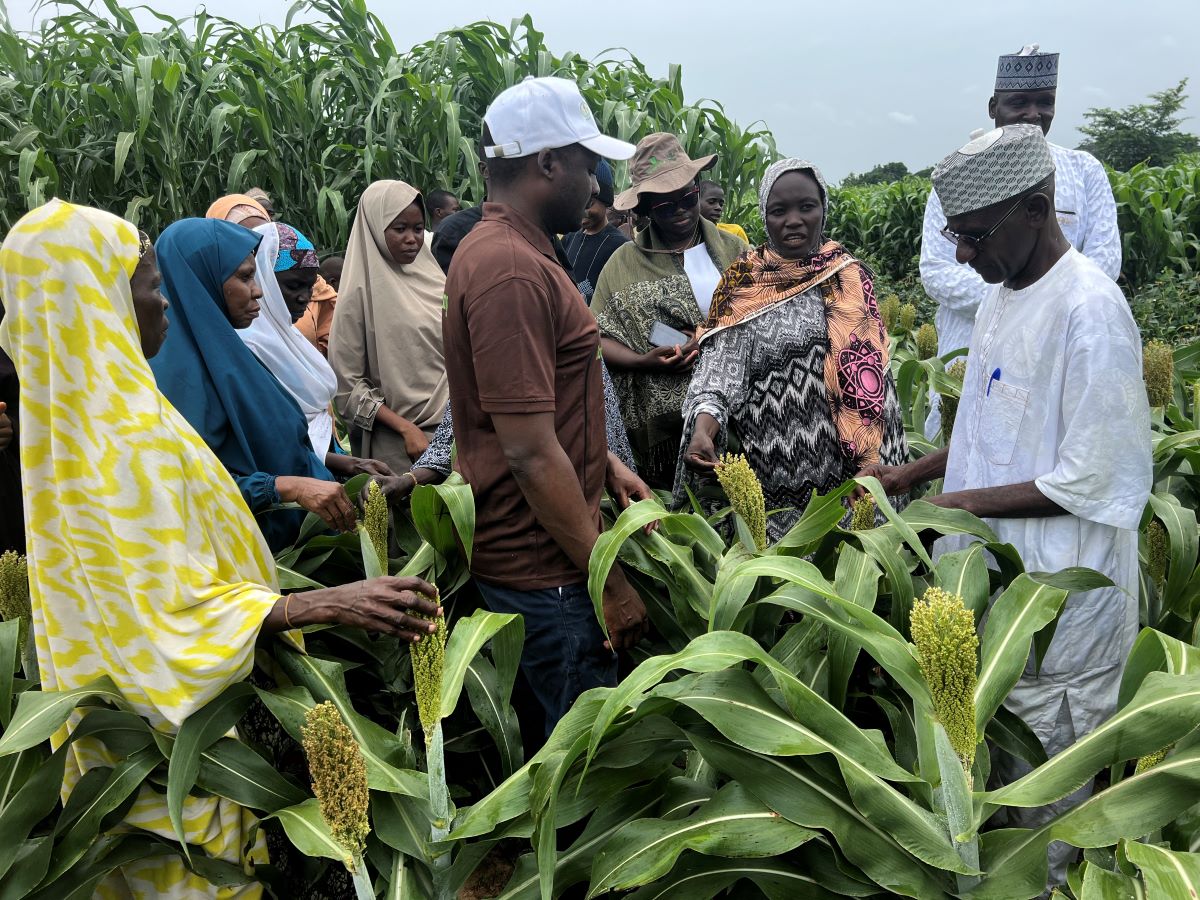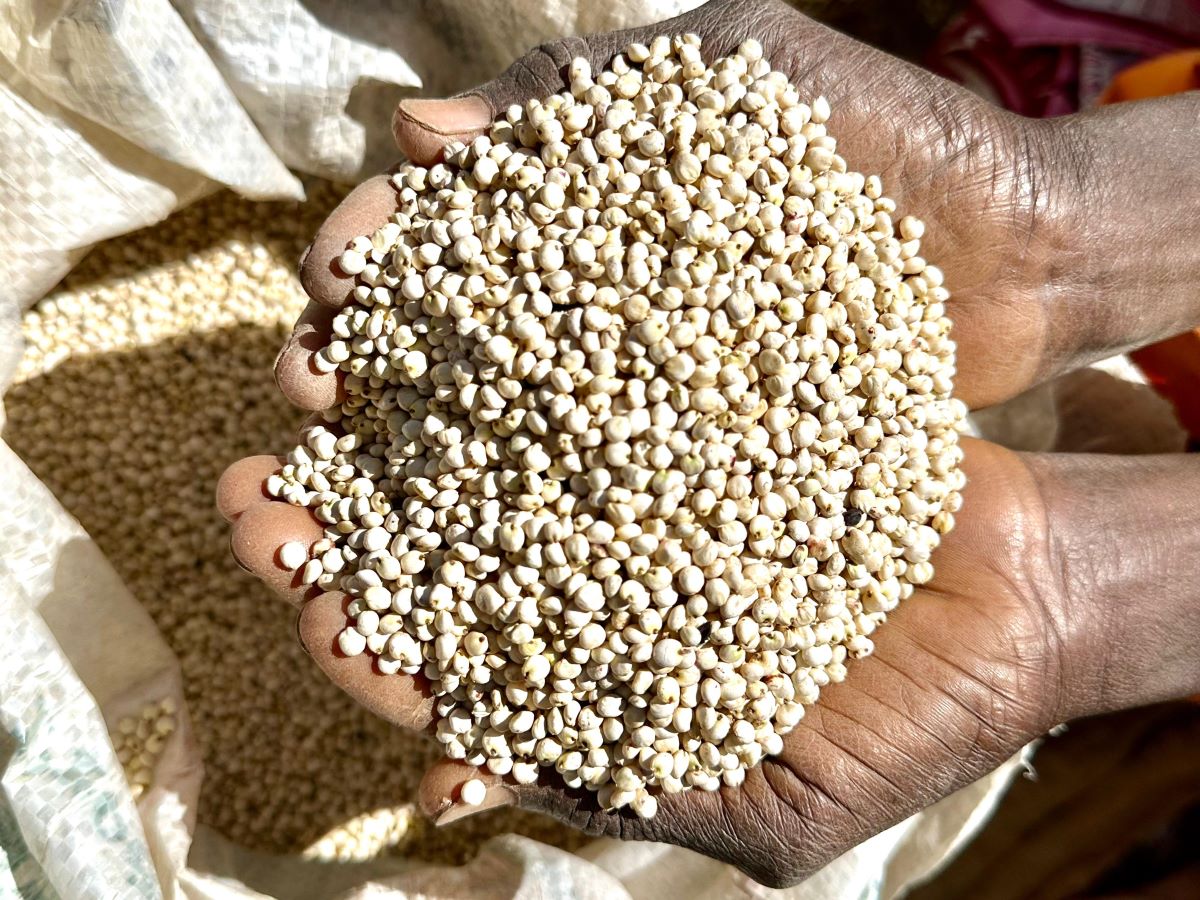February 13, 2025
In Nigeria’s drylands, a seed revolution is transforming the landscape, bringing hope and prosperity to farmers in even the most remote communities. Through the innovative Farm and Community-Managed Seed System (FCMSS) approach, farmers, women’s groups, and seed entrepreneurs are gaining access to high-quality sorghum seed, driving agricultural transformation in underserved regions.
Championed by the Institute for Agricultural Research (IAR) and the Dryland Crops Program through the AVISA project led by CIMMYT, this initiative bridges the gap between traditional and formal seed systems, delivering life-changing solutions to last-mile farmers and enhancing rural livelihoods across the country.
Empowering communities through innovation
The FCMSS approach combines community-driven strategies with institutional support to ensure improved seed availability, accessibility, and adoption. The impact has been profound, with three newly released sorghum varieties—SAMSORG 52, SAMSORG 52, and SAMSORG 53—transforming the agricultural landscape. These varieties are being produced locally, ensuring that farmers in nearby communities have access to seeds tailored to their needs.
Farmers achieve record yields
For farmers like Abdullahi Danliti Dawanau, the FCMSS approach has been life changing. Cultivating SAMSORG 52, Dawanau achieved an impressive 4 tons per hectare—the best yield of his farming career.
“This is the best yield I’ve achieved in all my years of farming,” he shared, highlighting the transformative potential of the new sorghum varieties.
His farm, located near the Dawanau International Grain Market in Kano State, has become a demonstration site, inspiring fellow farmers and drawing admiration for the high yield and quality of the variety. Many even mistake it for an imported hybrid, underscoring its quality and productivity.
 Women are leading the production and distribution of new sorghum varieties across several states in Nigeria. (Photo: Muhammad Ahmad Yahaya/IAR )
Women are leading the production and distribution of new sorghum varieties across several states in Nigeria. (Photo: Muhammad Ahmad Yahaya/IAR )
Women farmers leading the way
Women are emerging as key drivers of this agricultural revolution. The Yakasai Women Farmers Group in Kano State, led by Rabi Yakasai, is spearheading efforts to produce and distribute the new sorghum varieties. Their success has led to an overwhelming demand for the seeds in states such as Kano, Jigawa, Gombe, Bauchi, and Yobe, as well as in neighboring Niger Republic.
“These varieties fit perfectly into our farming systems,” said Mrs. Yakasai, emphasizing how they cater to local agricultural needs. SAMSORG 52, for instance, is an early-maturing and short-statured variety that aligns well with relay cropping systems, particularly when intercropped with cowpea. Similarly, SAMSORG 52 and SAMSORG 53 are medium-maturing varieties suitable for intercropping with millet and maize. These varieties provide tailored solutions to enhance productivity and sustainability for farmers in the region.
Following their participation in TRICOT on-farm trials, the group is working to meet increasing demand across multiple states.
“We need support to scale up seed production and meet these orders,” added Mrs. Yakasai.
Government and industry support success
The success of the FCMSS approach has garnered support from state governments and private sector stakeholders. During the 2nd National Sorghum Conference, held in Gombe State on December 4-5, 2024, the Gombe State Commissioner for Agriculture reaffirmed the state’s commitment to adopting climate-smart, early maturing sorghum varieties.
Private companies are also getting involved. GreenPal Global Limited, a prominent seed company, is stepping up its efforts to meet growing demand. Following successful trials of the new varieties, the company plans to scale up the production of certified seed by 2025. Similarly, Northern Nigeria Flour Mill, the country’s largest sorghum processor, is working with farmer associations such as SOFAN and NASPPAM to source quality sorghum for its flagship product, Golden Penny Dawavita—a key ingredient in staple foods such as Tuwo (a dish made from sorghum or millet flour, cooked into a thick, smooth paste or dough-like consistency) and Dumame (a dish made from fermented sorghum or millet flour, often cooked into a thick porridge).
 Locally produced grains of the new sorghum variety, ensuring farmers in nearby communities have access to seeds tailored to their needs. (Photo: Muhammad Ahmad Yahaya/IAR )
Locally produced grains of the new sorghum variety, ensuring farmers in nearby communities have access to seeds tailored to their needs. (Photo: Muhammad Ahmad Yahaya/IAR )
Ensuring quality and certification
The National Agricultural Seed Council (NASC) is actively supporting the initiative by training seed entrepreneurs and monitoring seed production to ensure quality standards. During a Brown Field Day in Bagadawa community, Kano State, NASC commended the progress made under the FCMSS and the active involvement of farmers and women’s groups.
“The progress of the FCMSS and the active participation of farmers and women’s groups are truly commendable,” said the North-West Regional Director of NASC.
A brighter future for the drylands of Nigeria
The FCMSS approach is more than a seed production system—it is a movement transforming the lives of farmers and communities. By building a resilient seed system, empowering local communities, and driving economic growth, the initiative is ensuring food security and prosperity in Nigeria’s drylands. With growing momentum, the future is bright for farmers, processors, and entrepreneurs, signaling a new era of agricultural success.